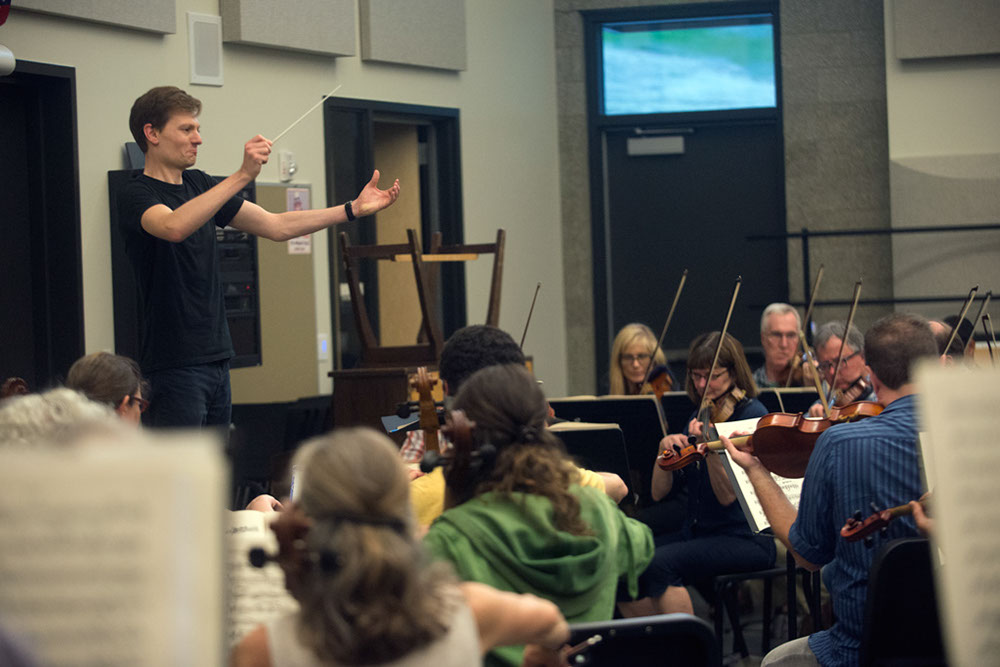For any music-making organization, a change in leadership is a challenge; but when the change is unexpected, sudden, and tragic—and when the leader in question was the only one the organization had ever had—it’s immeasurably more difficult. So when Clinton Smith takes the podium Saturday night to conduct Orchestra Seattle and the Seattle Chamber Singers in music by Ives, Barber, Elgar, and others to close his first year as their head, it’ll represent the end of a time of flux and the return of a measure of normalcy for one of the region’s most accomplished community ensembles.
Conductor/keyboardist George Shangrow, who had founded the Singers in 1969 (at age 18!) and Orchestra Seattle a decade later, was killed in a car accident in the summer of 2010. But the stricken performers were never in doubt about whether to continue, violinist and board member Stephen Hegg reported at the time: “I think it was almost a simultaneous thought for most people: ‘How do we go on after this,’ but ‘We must go on.’ I don’t know anybody who thought ‘We’re going to disband.’ To disband now would be such an offense to George.”
The void was filled by two years of guest conductors and a season-long search in which six candidates (out of 50 or so applicants from around the world) were invited to conduct the dual ensemble. But last June 24, OS/SCS named Smith, 32, its second music director in 44 years. Like Shangrow, he’s a musician of exceptional versatility, studying piano and violin as well as conducting at the Universities of Texas and Michigan and working in choral, chamber, and contemporary music. (Under Shangrow, OS/SCS established a reputation for being amenable to local composers.) From Michigan, Smith moved to a post with the Minnesota Opera, which led to the conductorship, which he still holds, of the St. Cloud Symphony (also in Minnesota). Freelance and summer-festival work from San Francisco to Juilliard and Portland to Santa Fe extends his resume impressively.
Three years was “just the right amount of time” for the transition, Smith feels; one thing the organization needed to do was enlarge its infrastructure. “George did everything,” Smith says; “this was his life”—including scheduling, arranging venues, courting donors, and more. One of OS/SCS’s challenges, he says, was to first “figure out a leadership strategy minus a music director.”
Kenna Smith-Shangrow—violinist, board member, search-committee member, and George’s sister-in-law—agrees. The accident “left this huge vacuum . . . we were scrambling in the midst of our own grief and shock.” But when at last time came to launch a search, the organization was committed to as much transparency and musician input as possible. The first step was to poll orchestra and chorus members as to how the selection criteria should be prioritized: musical interpretation? personality? fundraising ability?
One thing that turned out to be vital to the Singers, unsurprisingly, was skill in choral conducting. “We’re not just an orchestra, not just a chorus,” Smith-Shangrow makes clear, “we’re married. It’s always been who we are.” Though “Clinton was kind of the outlier,” she says—most of the other auditioners were local conductors they had worked with—his opera experience was a boon at their first encounter: “The chorus was mind-blown . . . he was the first person that came in and really understood the chorus—they were starving.” Smith and Smith-Shangrow agree there was immediate rapport; he calls it a “connection,” she marvels at the “comfort level.”
Naturally the getting-to-know-you period is ongoing. Smith-Shangrow mentions their December Messiah, an annual signature work for Shangrow, as an eye-opener. For decades they’d done it George’s way—“We knew every phrase, every nuance”—but under Smith they had an opportunity to “relearn the piece,” she says.
Trumpeter Janet Young agrees, heartened by the way Smith “respected that love and loyalty and sense of tradition” that Shangrow had inspired while bringing his own fresh ideas. “We’re aiming for a crisp, clear sound,” she says, and Smith reduces the size of the string section when appropriate for a better balance with the Singers. Smith is expanding the ensemble’s repertory; in choosing Elgar’s cantata The Music-Makers for this Saturday’s concert, he says, he deliberately sought a piece they’d never done.
Young is also impressed with some of the new chorus members who have joined; “recruitment had been difficult,” she says, in the interim seasons, but Smith’s hiring established a stability that has attracted new members.
OS/SCS’s March 15 concert showed them at their peak, with Smith leading a powerful Mozart Requiem, a meltingly poignant performance of Samuel Jones’ Elegy, and a Liszt Totentanz with pianist Mark Salman that blew the audience’s hair back in the intimate confines of Queen Anne’s First Free Methodist Church. It’s a testament to the strong foundation Shangrow built, and the dedication he inspired, that these musicians are able to thrive with a new hand on the helm. But he’ll remain a guiding spirit for many. “I have some of his ashes in my violin case,” reports Smith-Shangrow of the man who was not only a maestro but a family member. “He comes with me to all the rehearsals.” E
gborchert@seattleweekly.com
First Free Methodist Church 3200 Third Ave. W., 682-5208, osscs.org. $10–$25 (17 and under free). 7:30 p.m. Sat., May 10.







